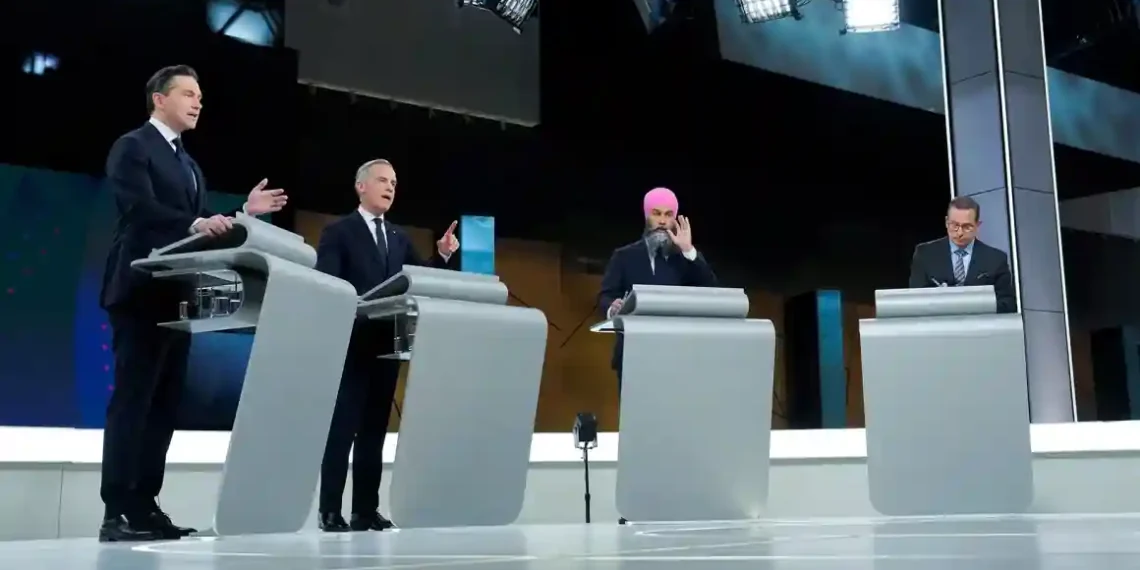Canadians Look for a New Defender as Trump Sparks Anger and Fear
With only five weeks to go, Canada’s election campaign is a whirlwind, moving at lightning speed and with little change in its rhythm. Despite the fast pace, Canadians are tuning in with interest, especially as national leaders – including Prime Minister Mark Carney and his main rival Pierre Poilievre – face off in heated debates in both French and English.
While the focus remains on the domestic race, two figures loom large in voters’ minds: U.S. President Donald Trump and former Canadian Prime Minister Justin Trudeau.
For Carney, a political newcomer who only recently became Prime Minister, Trump has proven to be a valuable adversary. Throughout the debates, Carney repeatedly invoked Trump’s threats as a rallying cry for his leadership.
“We can give ourselves far more than Donald Trump can ever take away,” Carney declared early on, setting the stage for a fiery two-hour debate featuring leaders from the four main Canadian political parties, including Bloc Québécois leader Yves-François Blanchet and NDP leader Jagmeet Singh.
Carney wasn’t shy about returning to Trump’s aggressive rhetoric during a crisis. “You’ve got to plan for the worst. The worst is that the U.S. actually does want to take us over,” he said, referencing Trump’s past threats to annex Canada and make it America’s 51st state.
In his closing statement, Carney didn’t hold back. “They want our land, they want our resources, they want our water, they want our country. And we’re all going to stand up against Donald Trump. I’m ready,” he declared, positioning himself as the defender of Canadian sovereignty.
On the other side, Conservative leader Pierre Poilievre didn’t hesitate to attack Carney for being too close to Justin Trudeau’s legacy. “How can we possibly believe that you are any different than the previous 10 years of Liberal government?” Poilievre fired back, questioning whether Carney was truly a break from the Trudeau era.
Poilievre continued to draw comparisons to the current Liberal government, challenging Carney on whether he was simply running for a fourth term of Liberal rule. “Mr. Carney, Justin Trudeau’s staffers are actually here with you at this debate, in Montreal, writing the talking points that you’re regurgitating into the microphone,” Poilievre said, aiming to diminish Carney’s political credibility.
Carney quickly rebutted, “I do my own talking points, thank you very much,” before once again turning the conversation back to Trump. “The biggest risk we have to affordability, the biggest risk we have to this economy is Donald Trump, so first and foremost we’ve got to get that right.”
While the debate was intense, it’s unlikely to have shifted many voter preferences. Carney, who surged in the polls after taking over from Trudeau, remains the front-runner, but the race is still tight. Longtime pollster Andrew Enns described the election as “parked,” with little movement in public opinion leading up to the April 28 vote.
Despite the challenges, Carney’s rise has been nothing short of extraordinary. Having never run for office before, his transition from central banker to Prime Minister has captivated Canadians, with polls showing a dramatic reversal in the political landscape. In January, Trudeau’s Liberals trailed Poilievre’s Conservatives by 24 points. But after Carney’s rise to power, the polls flipped, and he now leads Poilievre by 7 points, according to Leger polling.
Before Carney entered the race, Poilievre had built a strong base with his populist rhetoric and “Axe the Tax” mantra, which resonated with Canadians opposed to the carbon tax. However, Carney quickly neutralized Poilievre’s platform by axing the carbon tax himself, removing a key issue from Poilievre’s playbook.
Carney took a sharp jab at Poilievre during the debate, saying, “It may be difficult for Mr. Poilievre, you spent years running against Justin Trudeau and the carbon tax, and they’re both gone.”
Still, Enns points out that there is a hunger for change after nearly a decade of Liberal rule, and Poilievre still has a shot at recapturing the political momentum he had before Carney’s rise. “He really did put forward clear things he would do to address what he talks about as the lost decade under the Liberal government,” Enns said, adding that Poilievre may have planted seeds of doubt among voters who are still leaning toward Carney and the Liberals.
Ultimately, the question on many voters’ minds is whether Canada is ready for another Liberal term under Carney, or if it’s time for change. As the election looms, many Canadians are likely to continue to weigh the risks posed by Trump’s threats alongside the perceived failures of the Trudeau administration.
Carney’s message is clear: He is the one to defend Canada against Trump’s aggression. Poilievre, on the other hand, argues that a change in leadership is needed to break free from a decade of Liberal rule.
In the end, it’s not just about who is running—Canadians will be weighing the legacies of two men not even on the ballot: Trump and Trudeau.
This article was rewritten by JournosNews.com based on verified reporting from trusted sources. The content has been independently reviewed, fact-checked, and edited for accuracy, neutrality, tone, and global readability in accordance with Google News and AdSense standards.
All opinions, quotes, or statements from contributors, experts, or sourced organizations do not necessarily reflect the views of JournosNews.com. JournosNews.com maintains full editorial independence from any external funders, sponsors, or organizations.
Stay informed with JournosNews.com — your trusted source for verified global reporting and in-depth analysis. Follow us on Google News, BlueSky, and X for real-time updates.














